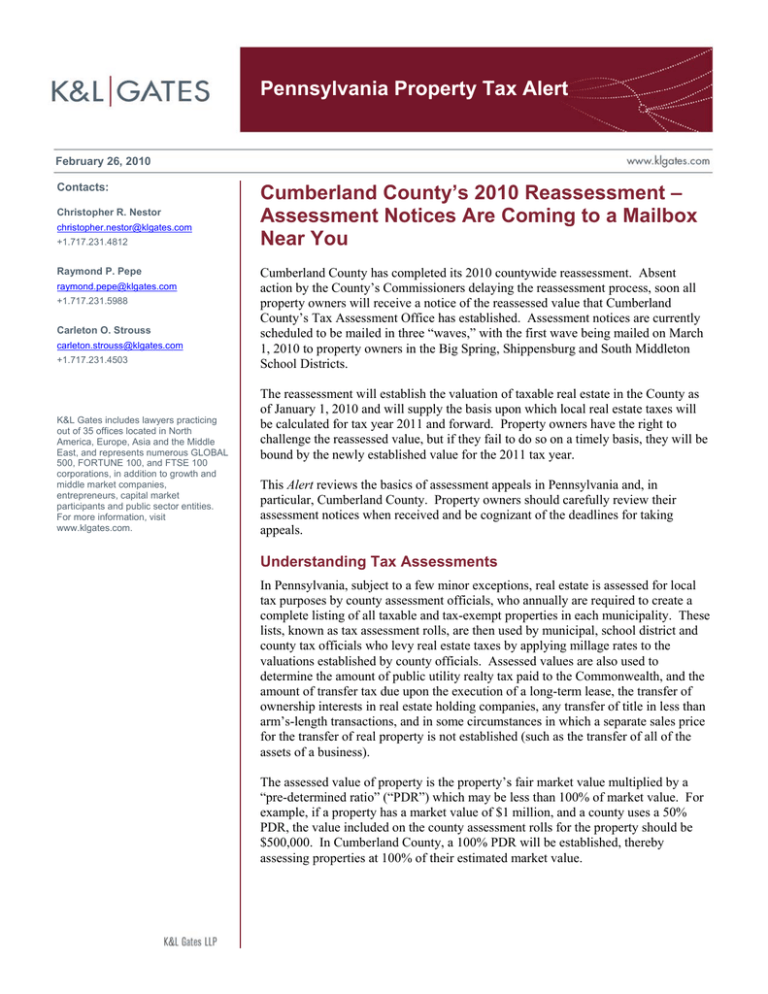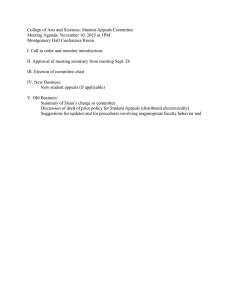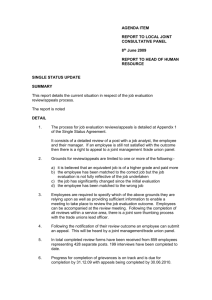
Pennsylvania Property Tax Alert
February 26, 2010
Contacts:
Christopher R. Nestor
christopher.nestor@klgates.com
+1.717.231.4812
Raymond P. Pepe
raymond.pepe@klgates.com
+1.717.231.5988
Carleton O. Strouss
carleton.strouss@klgates.com
+1.717.231.4503
K&L Gates includes lawyers practicing
out of 35 offices located in North
America, Europe, Asia and the Middle
East, and represents numerous GLOBAL
500, FORTUNE 100, and FTSE 100
corporations, in addition to growth and
middle market companies,
entrepreneurs, capital market
participants and public sector entities.
For more information, visit
www.klgates.com.
Cumberland County’s 2010 Reassessment –
Assessment Notices Are Coming to a Mailbox
Near You
Cumberland County has completed its 2010 countywide reassessment. Absent
action by the County’s Commissioners delaying the reassessment process, soon all
property owners will receive a notice of the reassessed value that Cumberland
County’s Tax Assessment Office has established. Assessment notices are currently
scheduled to be mailed in three “waves,” with the first wave being mailed on March
1, 2010 to property owners in the Big Spring, Shippensburg and South Middleton
School Districts.
The reassessment will establish the valuation of taxable real estate in the County as
of January 1, 2010 and will supply the basis upon which local real estate taxes will
be calculated for tax year 2011 and forward. Property owners have the right to
challenge the reassessed value, but if they fail to do so on a timely basis, they will be
bound by the newly established value for the 2011 tax year.
This Alert reviews the basics of assessment appeals in Pennsylvania and, in
particular, Cumberland County. Property owners should carefully review their
assessment notices when received and be cognizant of the deadlines for taking
appeals.
Understanding Tax Assessments
In Pennsylvania, subject to a few minor exceptions, real estate is assessed for local
tax purposes by county assessment officials, who annually are required to create a
complete listing of all taxable and tax-exempt properties in each municipality. These
lists, known as tax assessment rolls, are then used by municipal, school district and
county tax officials who levy real estate taxes by applying millage rates to the
valuations established by county officials. Assessed values are also used to
determine the amount of public utility realty tax paid to the Commonwealth, and the
amount of transfer tax due upon the execution of a long-term lease, the transfer of
ownership interests in real estate holding companies, any transfer of title in less than
arm’s-length transactions, and in some circumstances in which a separate sales price
for the transfer of real property is not established (such as the transfer of all of the
assets of a business).
The assessed value of property is the property’s fair market value multiplied by a
“pre-determined ratio” (“PDR”) which may be less than 100% of market value. For
example, if a property has a market value of $1 million, and a county uses a 50%
PDR, the value included on the county assessment rolls for the property should be
$500,000. In Cumberland County, a 100% PDR will be established, thereby
assessing properties at 100% of their estimated market value.
Pennsylvania Property Tax Alert
As an alternative to having property assessed based
upon its market value, property owners may also
apply to have tracts of ten acres or more presently
devoted to agricultural use, used as a farmstead,
designated as agricultural reserve open to the public
for outdoor recreation, or designated for as a forest
reserve for the production of timber and wood
products, preferentially assessed based upon "use
values" as determined annually by Pennsylvania
Department of Agriculture. If property is
preferentially assessed based upon its use value,
however, and is subsequently dedicated to another
use, the property will be subject to a roll-back tax
plus interest at the rate of six percent annually.
Not all types of property, or improvements made to
property, are subject to assessment in Pennsylvania.
For example, machinery and equipment used in
industrial establishments, signs, oil and gas interests,
and a variety of other types of interests in and
improvements made to property may not be subject
to assessment and taxation.1 As a result, the fair
market value for tax assessment purposes may be
less than what many property owners consider the
actual value of their property which could be derived
from an arm’s-length sale.
While counties must annually certify local tax
assessment rolls to local officials, counties may only
change or “reassess” the value of properties in
limited circumstances. Counties may change
assessed values (1) pursuant to a countywide
reassessment; (2) if new improvements are made to
a property, or in the event of casualty losses; (3) if
properties are subdivided; or (4) to correct clerical
errors and omissions. Any other changes made to
assessed values by county assessment officials may
constitute “spot assessments,” which are prohibited
by Pennsylvania law.
Cumberland County’s 2010
Countywide Reassessment
Cumberland County is a Fourth Class County and is
subject to the Fourth to Eighth Class County
Assessment Law, 72 P.S. §§ 5453.101 - 5453.706,
and the General County Assessment Law, 72 P.S. §§
5020-101 - 5020.602. The Pennsylvania
1
See 72 P.S. § 5453.201.
Constitution, article VIII, section 1 (the “Uniformity
Clause”) and County Assessment Laws require real
estate assessments to be uniform and fair. In order
to establish and maintain a uniform and fair
property taxation scheme, a county must
periodically perform a countywide reassessment.
According to Cumberland County, while property
values have changed an average of over 20% since
the County’s last reassessment in 2004, not all
properties and property types have appreciated at
the same rate.2 The result, according to the County,
is that the property tax system used by local taxing
bodies has lost its basis in market values and thus its
fairness.3 The intent of the 2010 reassessment is to
restore equity to the real estate tax system by
revaluing all properties in the County at once, as
prescribed by Pennsylvania law.4
To conduct a countywide reassessment, the County
must value all of its taxable real estate as of the
same date in time. For purposes of Cumberland
County’s 2010 reassessment, that date is January 1,
2010.5 The new valuations established by the 2010
reassessment are scheduled to be certified on
November 15, 2010 and will go into effect for
county, city and borough taxes levied for calendar
year 2011, and for school taxes levied for the 201112 fiscal year.6
To perform the 2010 countywide reassessment, the
County’s Tax Assessment Office gathered and
reviewed property data maintained in its CAMA, or
Computer Assisted Mass Appraisal, program.7 At
the same time, the Assessment Office divided the
County into “neighborhoods” that, according to the
County, consist of similar properties that tend to
behave in a similar way in the market. The County
then provided its CAMA, neighborhood and other
data to 21st Century Appraisals out of Middletown,
2
See http://www.ccpa.net/index.aspx?nid=3350.
Id.
4
Id.
5
See “Cumberland County 2010 Reassessment Guide”
(Revised 1/22/2010), at p. 2, available at
http://www.ccpa.net/index.aspx?nid=3350 (“Reassessment
Guide”).
6
Id. at p. 4; see also 72 P.S. § 5453.703(c)(5).
7
See Reassessment Guide at pp. 2-3 (describing the
reassessment process).
3
February 26, 2010
2
Pennsylvania Property Tax Alert
Pennsylvania. 21st Century Appraisals creates and
returns mathematical valuation models and
suggested property values to the County for review
and quality control. The County’s assessors then use
a variety of statistical and other tools to review and
validate those values. The County’s Chief Assessor
conducts the final review on each neighborhood.8
As noted above, assessment notices are currently
scheduled to be mailed in three “waves,” with the
first wave to be mailed on March 1, 2010. The
following is the current schedule for the mailing of
assessment notices:
School Districts and
Component Municipalities
Mail Date
Big Spring, Shippensburg, South
Middleton
Carlisle, West Shore,
Mechanicsburg
Cumberland Valley, East Penn,
Camp Hill
March 1, 2010
May 3, 2010
July 1, 2010
Appealing Your New Assessment
Once a property owner receives a notice of
assessment (which must be mailed by the County no
later than July 1, 2010), the property owner must
decide whether to appeal the new assessment.9 An
appeal is filed with the Cumberland County Board
of Assessment Appeals. An appeal from a new
assessment value from a countywide reassessment
must be filed within 30 days from the mailing date
of the assessment notice.10 In 2010, applications
8
Id. at p. 3.
It is important to note that the school districts and
municipalities in which the real property at issue is located may
also file appeals or may oppose any appeals filed by
taxpayers.
10
72 P.S. § 5453.701(c)(3). Notwithstanding the existence of
a statutory 30-day deadline for the filing of assessment
appeals in Fourth the Eighth Class Counties following a
countywide reassessment, the County has indicated that it will
afford property owners dissatisfied with their new assessments
the opportunity to have an “informal” appeal and will accept
assessment appeals filed within 40 days of the mailing date of
the reassessment notice. See Reassessment Guide at pp. 3,
13. An informal appeal will consist of a meeting between the
property owner and a County Appraiser, during which the
property owner can provide evidence as to why his or her new
market value is incorrect. If the property owner and the
Assessor agree on a new value, then the assessment is
9
for preferential assessments for agricultural,
farmstead, agricultural reserve and forest reserve
lands must also be filed within 30 days of the
mailing date of the reassessment notice.
Once an appeal is filed, the Cumberland County
Board of Assessment Appeals will schedule a
hearing. The Board may schedule the hearings as
early as 30 days after mailing the notice and no later
than October 31, 2010.11 The Board must also act
on all appeals no later than October 31, 2010.12
During the hearing, the taxpayer may present its
appraisal along with any additional evidence
challenging the Board’s assessment.13 While the
proceedings before the Board are somewhat
informal, the Board has adopted rules of procedure
governing appeals and hearings that must be
adhered to by the parties.
After hearing the appeal, the Board may raise, lower
or choose not to change the reassessed value. If the
taxpayer does not agree with the Board’s decision
on their assessment appeal, then the taxpayer has 30
days in which to file an appeal with the Cumberland
County Court of Common Pleas.14 The County
Court will hear the appeal “de novo,” which means
it will afford the decision of the Board no weight
once other competent evidence of value is presented
to the Court.
changed and the owner will not need to file a formal appeal. It
is important to note, however, that: (1) the “informal” appeals
process being offered by the County does not stay or extend
the deadline for filing a formal appeal; and (2) the 40-day
deadline being established by the County for the taking of
assessment appeals is questionable in light of the language of
the assessment statutes. Thus, to avoid any uncertainty, a
taxpayer unhappy with the results of the reassessment,
including the “informal” review process, should file formal
appeals within 30 days of the mailing date of a reassessment
notice. If timely appeals are not filed for 2011, a property
owner will be unable to challenge the new assessment until
the appeal period for tax year 2012.
11
72 P.S. § 5453.701(c)(6).
12
Id.
13
Market values must generally be based on an evaluation of
comparable sales, construction and land costs, and
capitalized real or estimated rental rates for property, and
should not take into consideration so-called “value-in-use,”
i.e., the value of property to operate a particular business on a
site or the income generated by business activities
independent of the property interest itself (e.g., real estate
rental income may be taken into account).
14
72 P.S. § 5453.704.
February 26, 2010
3
Pennsylvania Property Tax Alert
Even if the taxpayer files an appeal, the taxpayer is
obligated to pay all taxes levied on the reassessed
value while the appeal is pending.15 If the appeal is
successful, the taxpayer will then be entitled to a
refund of the excess taxes paid.
While assessment appeals can be pursued informally
and without counsel or professional appraisal
assistance, for properties of substantial value, the
best approach may be to assemble a team of legal
and appraisal professionals from the inception of an
appeal. Making an investment in the resources
needed to present a strong case to the county board
typically may pay dividends by avoiding the need
for subsequent appeals, or by lowering assessments
that will apply during the judicial appeals. Having
effective assistance from the inception of an appeal
may also be important if school districts and other
local taxing authorities intervene into assessment
appeals (as they often do) and advocate higher
assessments.
challenges to assessment practices and efforts by
counties to newly impose taxes upon particular
classes of properties.
The approach taken to assessment appeals by K&L
Gates involves a focus on the value of appeals to
clients and often involves working cooperatively
from the initiation of any engagement with
independent professional appraisers.
For more information regarding K&L Gates and its
real estate tax assessment practice, contact the
representatives listed above.
In deciding whether to pursue assessment appeals,
property owners should balance the costs versus the
benefits of appeals. The extent to which benefits are
possible is a function of local tax rates; the extent to
which reductions in assessed values are reasonably
obtainable; and the period of time for which new
assessed values are likely to remain in place until the
next reassessment. These potential benefits must
then be balanced against anticipated costs and the
risk an appeal will not be successful.
Knowledgeable lawyers who practice in this area,
and consultants who specialize in assisting property
owners with assessment appeals, can help to counsel
clients on this balancing.
K&L Gates LLP
Attorneys with K&L Gates have been active in
assessment appeals in a large number of
Pennsylvania counties and other jurisdictions and
have typically focused their work on properties of
substantial value. Some representative engagements
include the reassessment of retail facilities, power
plants, office buildings, industrial facilities, landfills,
and properties affected by environmental
contamination. The attorneys at K&L Gates have
also counseled clients regarding uniformity
15
Id.
February 26, 2010
4
Pennsylvania Property Tax Alert
Anchorage Austin Beijing Berlin Boston Charlotte Chicago Dallas Dubai Fort Worth Frankfurt Harrisburg Hong Kong London
Los Angeles Miami Moscow Newark New York Orange County Palo Alto Paris Pittsburgh Portland Raleigh Research Triangle Park
San Diego San Francisco Seattle Shanghai Singapore Spokane/Coeur d’Alene Taipei Tokyo Washington, D.C.
K&L Gates includes lawyers practicing out of 35 offices located in North America, Europe, Asia and the Middle East, and represents numerous
GLOBAL 500, FORTUNE 100, and FTSE 100 corporations, in addition to growth and middle market companies, entrepreneurs, capital market
participants and public sector entities. For more information, visit www.klgates.com.
K&L Gates is comprised of multiple affiliated entities: a limited liability partnership with the full name K&L Gates LLP qualified in Delaware and
maintaining offices throughout the United States, in Berlin and Frankfurt, Germany, in Beijing (K&L Gates LLP Beijing Representative Office), in
Dubai, U.A.E., in Shanghai (K&L Gates LLP Shanghai Representative Office), in Tokyo, and in Singapore; a limited liability partnership (also named
K&L Gates LLP) incorporated in England and maintaining offices in London and Paris; a Taiwan general partnership (K&L Gates) maintaining an
office in Taipei; a Hong Kong general partnership (K&L Gates, Solicitors) maintaining an office in Hong Kong; and a Delaware limited liability
company (K&L Gates Holdings, LLC) maintaining an office in Moscow. K&L Gates maintains appropriate registrations in the jurisdictions in which its
offices are located. A list of the partners or members in each entity is available for inspection at any K&L Gates office.
This publication is for informational purposes and does not contain or convey legal advice. The information herein should not be used or relied upon
in regard to any particular facts or circumstances without first consulting a lawyer.
©2010 K&L Gates LLP. All Rights Reserved.
February 26, 2010
5





